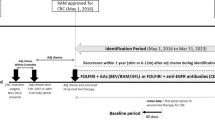Summary
Purpose A two stage multi-institution Phase II study was undertaken by the Princess Margaret Hospital Consortium to evaluate the efficacy and toxicity of oral cediranib, an inhibitor of vascular endothelial growth factor receptors 1 and 2, in patients with previously untreated advanced malignant melanoma. Patients and Methods Between May 2006 and April 2008, 24 patients (median age 65 years) with advanced malignant melanoma were treated with oral cediranib. Cediranib was given on a continuous, oral once daily schedule of 45 mg, on a 28 day cycle. Results Of the 17 patients evaluable for response, there was stable disease in 8 patients, and progressive disease in 9 patients, with no objective responses seen. Only 2 patients had stable disease >/= 6 months, thus the study was terminated at the end of stage 1 accrual. The overall median survival was 9.9 months, and the median time to progression was 3.5 months. The most frequent non-hematologic adverse events were hypertension (78 %), fatigue (69 %), diarrhea (69 %) and anorexia and nausea (each 57 %). Conclusions Although 2 patients had stable disease at 6 months, the short median time to progression and lack of any objective responses indicate that single agent cediranib at this dose and schedule is not sufficiently active to warrant study continuation.
Similar content being viewed by others
References
Wedge SR, Kendrew J, Hennequin LF, et al. (2005) AZD2171: a highly potent, orally bioavailable, vascular endothelial growth factor receptor-2 tyrosine kinase inhibitor for the treatment of cancer. Cancer Res 65:4389–4400
Streit M, Detmar M (2003) Angiogenesis, lymphangiogenesis, and melanoma metastasis. Oncogene 22:3172–3179
Simonetti O, Lucarini G, Brancorsini D, et al. (2002) Immunohistochemical expression of vascular endothelial growth factor, matrix metalloproteinase 2, and matrix metalloproteinase 9 in cutaneous melanocytic lesions. Cancer 95:1963–1970
Ugurel S, Rappl G, Tilgen W, et al. (2001) Increased serum concentration of angiogenic factors in malignant melanoma patients correlates with tumor progression and survival. J Clin Oncol 19:577–583
Therasse P, Arbuck S, Eisenhauer EA, et al. (2000) New guidelines to evaluate the response to treatment in solid tumors; European organization for research and treatment of cancer, national cancer institute of the United States, national cancer institute of Canada. J Nat Cancer Inst 92:205–216
Simon R (1989) Optimal two-stage designs for phase II clinical trials. Controlled Clin Trials 10:1–10
Mitchell CL, O’Connor JP, Roberts C, et al. (2011) A two-part phase II study of cediranib in patients with advanced solid tumours: the effect of food on single-dose pharmacokinetics and an evaluation of safety, efficacy and imaging pharmacodynamics. Cancer Chemother Pharmacol 68:631–641
Ryan JR, Stadler WM, Roth B, et al. (2007) Phase I dose escalation and pharmacokinetic study of AZD2171, an inhibitor of the vascular endothelial growth factor receptor tyrosine kinase, in patients with hormone refractory prostate cancer (HRPC). Investig New Drugs 25:445–451
Matulonis UA, Berlin S, Ivy P, et al. (2009) Cediranib, an oral inhibitor of vascular endothelial growth factor receptor kinases, is an active drug in recurrent epithelial ovarian, fallopian tube, and peritoneal cancer. J Clin Oncol 27:5601–5606
Garland LL, Chansky K, Wozniak AJ, et al. (2011) Phase II study of cediranib in patients with malignant pleural mesothelioma: SWOG S0509. J Thoracic Oncol 6:1938–1945
Goodwin R, Ding K, Seymour L, et al. (2010) Treatment-emergent hypertension and outcomes in patients with advanced non-small-cell lung cancer receiving chemotherapy with or without the vascular endothelial growth factor receptor inhibitor cediranib: NCIC clinical trials group study BR24. Ann Oncol 21:2220–2226
Varker KA, Biber JE, Kefauver C, et al. (2007) A randomized phase 2 trial of bevacizumab with or without daily low-dose interferon alfa-2b in metastatic malignant melanoma. Ann Surg Oncol 14:2367–2376
Perez DG, Suman VJ, Fitch TR, et al. (2009) Phase 2 trial of carboplatin, weekly paclitaxel, and biweekly bevacizumab in patients with unresectable stage IV melanoma: a North Central cancer treatment group study, N047A. Cancer 115:119–127
Hauschild A, Agarwala SS, Trefzer U, et al. (2009) Results of a phase III, randomized, placebo-controlled study of sorafenib in combination with carboplatin and paclitaxel as second-line treatment in patients with unresectable stage III or stage IV melanoma. J Clin Oncol 27:2823–2830
Flaherty KT, Lee SJ, Zhao F, et al. (2013) Phase III trial of carboplatin and paclitaxel with or without sorafenib in metastatic melanoma. J Clin Oncol 31:373–379
Kendrew J, Odedra R, Logié A, et al. (2013) Anti-tumour and anti-vascular effects of cediranib (AZD2171) alone and in combination with other anti-tumour therapies. Cancer Chemother Pharmacol 71:1021–1032
Acknowledgments
This study (PHL-038/NCI 7137) is conducted by the Princess Margaret Hospital Phase II Consortium with support from US National Cancer Institute Grant #HHSN261201100032C.
Author information
Authors and Affiliations
Corresponding author
Ethics declarations
Conflict of interest
The authors declare they have no conflict of interest.
Rights and permissions
About this article
Cite this article
McWhirter, E., Quirt, I., Gajewski, T. et al. A phase II study of cediranib, an oral VEGF inhibitor, in previously untreated patients with metastatic or recurrent malignant melanoma. Invest New Drugs 34, 231–235 (2016). https://doi.org/10.1007/s10637-016-0324-0
Received:
Accepted:
Published:
Issue Date:
DOI: https://doi.org/10.1007/s10637-016-0324-0




